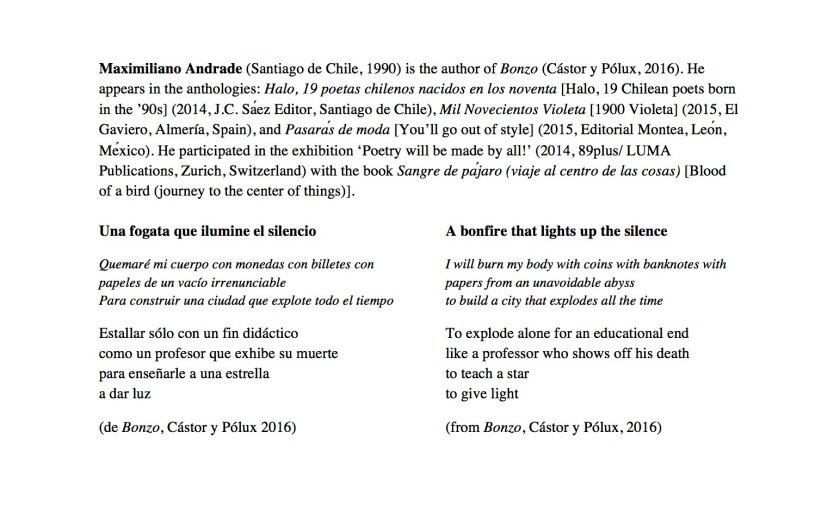Jessica Sequeira and Jessica Rainey both translate from Spanish to English. Their collaboration responds to the work of young Chilean poets and includes audio-visuals, translations and documentary poems sourced from Chilean news reports.
At the presentation (at which Jessica Sequeira could not be present, as she was in Chile) a video that she made with Jessica Rainey was screened while Jessica Rainey read over it.
WATCH HERE:
Read the text and watch the video piece below:








Part 3: process and presentation
Jessica Sequeira
I collaborated with Jessica Rainey, another translator from Spanish to English. For the Poettrio Experiment, we wanted to focus on Latin American poetry that included but was not limited to “straight” translations of the text from one language to another. Over email we threw around ideas about how we might incorporate video and documentary poetry. As I happen to be in Santiago de Chile at the moment, we also thought this would be a great opportunity to incorporate some work by contemporary poets, more or less young (under 40). With four poets who work at the Fundación Neruda in Chile, I recorded a video that combines abstract images, the poets’ readings of their work in Spanish, and my English language translations of the texts. This came to just under five minutes. The poets were very enthusiastic about getting involved, as well as about seeing their work translated, having it presented abroad, and opening it up to further avantgarde or creative possibilities; they were also very curious about Newcastle and its literary and translation scene! Jessica then had the great idea of producing “found poem” responses to the original poems and translations, incorporating documentary material from Chile. She wrote several docu-poems which are timed to be read during the live performance, during gaps in the video between poems and translations. This has been a wonderful process, which involved chance (my pairing with another Jessica working SP > EN; my presence in Santiago for a poetry festival at La Chascona), “standard” translation (the rendering of four poets’ work into English), collaboration (the use of documentary material inspired by Jessica’s background, which I would never have thought to add myself) and modernist techniques (the incorporation of cut-up texts using non-fiction materials). The title of our project, “The difficult art of living in Santiago de Chile”, is slightly tongue-in-cheek, but it was thought up in collaboration with the four Santiago poets, who all write urban literature that very much reflects their interests and concerns as poets in the capital.
Jessica Rainey
The fact that Jessica Sequeira was in Chile working with poets was too good an opportunity to miss and became the obvious starting point for our collaboration. We agreed that the Poettrio Experiment was a chance to experiment with translation processes or presentation options that we might not otherwise have the opportunity to explore, and early on decided that it would be great to introduce a multi-media aspect to the presentation as a way to ensure the (otherwise physically absent) presence of the majority of the participants. Beyond that, the collaboration became quite an organic process, and effectively fell into two parts. In Chile, Jessica S. worked with the source poets, adeptly selecting, translating, recording and producing an audio-visual film. Meanwhile, I considered options for introducing documentary elements into the project – background information, news clips or article extracts – though it was not until I received the texts and video that my possible contribution became clearer. I decided to select key words, images or concepts from each individual poem and run an online search for relevant reports from Chilean media sources or organisations. Rather than translate these sources wholesale, I used the reports to create ‘found’ or ‘documentary’ poem-translations to give a flavour of Chile as portrayed by its media, yet accessed and processed by an outsider who had never visited the country. Although sentences or phrases do not necessarily appear in consecutive order, the translation of each unit can be described as faithful, with the exception of the fourth poem where some words or phrases were intentionally omitted. Wilful mistranslation or misrepresentation of facts, however, was never an aim of this stage. Rather, the aim was to support the original poems in concept and tone while providing an objective counterpoint to the lyric and translated poems. Among the initial ideas for incorporating the found poems was to include subtitles on the video; however, as the video was complete and neither of us were sufficiently techie to easily introduce them, the only other possibility seemed to be a live reading alongside the video projection. The reading of the found poems at times overlaps the source poems, at times the translations, in what is an imperfect but hopefully interesting polyphonic experiment. In keeping with the idea of translation trios and poetry experiments, then, we have somewhat inadvertently produced a three-tiered project (source poems, translated poems plus additional translation layer) that began in Chile with a live collaboration between poets and an initial translator, and ends in Newcastle with a live performance involving a second translator and finished film.
